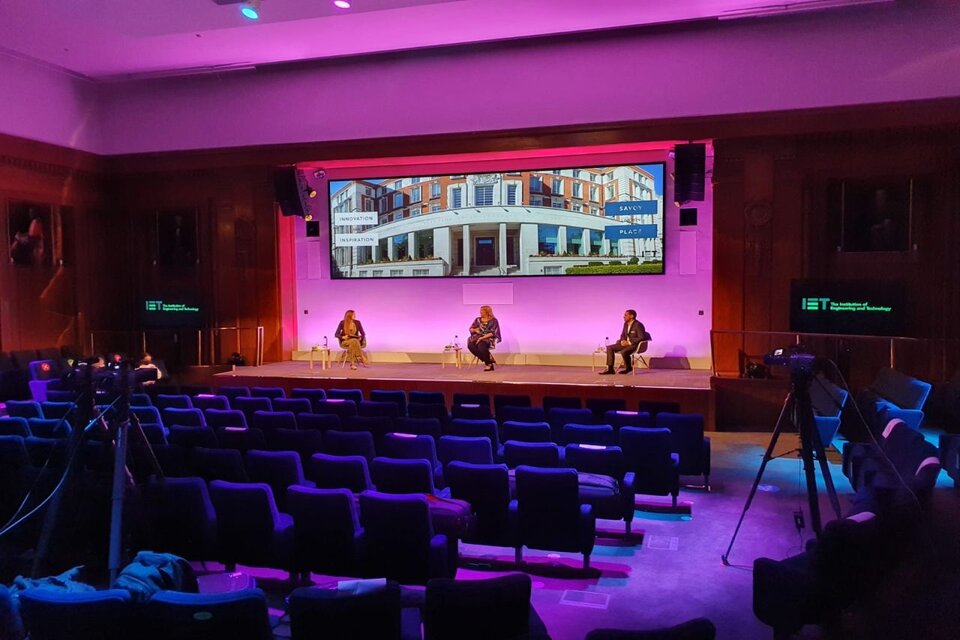‘Hybrid events’, combining elements of a live event with a virtual audience, is a term we’re hearing more frequently than ever right now.
Many event organisers will likely have some reservations about running a hybrid event for the first time, but tech-oriented venue IET London: Savoy Place has responded to these potential concerns with some reassuring insights and top tips.
What if technology lets me down?
We’ve all been accustomed to failed Zoom calls and frozen computer screens mid conversation this year, but working with a venue that offers the very best technology for events, selected by experienced AV professionals, can help alleviate this concern. Investing in proper production means not having to worry about sound or technical difficulties.
To settle nerves further, there are ways of minimising risk even more, for example using a combination of pre-recorded footage and live Q&As. With the right team of professionals behind the camera, this can be a seamless production, giving the illusion of a fully live event, but taking huge amounts of pressure off both the speakers and the organiser, having a large amount of the event content prepared in advance. This also allows time for editing and smartening up the footage or adding relevant holding screens between sessions.
I have no experience in running hybrid events
That’s why you work with people who have! The advantage of working with a venue that can offer its own AV and filming crew is that it isn’t just a sporadic group of experienced individuals that come together to run your event, but an integrated team of experts familiar with every inch and angle of the venue.
Working with a venue gives a hybrid event a lot more credibility, with an impressive backdrop and lighting that can’t easily be replaced by using a basic online platform. You’d be surprised by how much of an event organiser’s previous experience in running live events is transferable in terms of strategy, organisation and attention to detail, therefore joining forces with an AV team and in-house coordinator means that all bases will be covered for a seamless delivery.
It all sounds quite expensive to operate
The cost of a hybrid event covers the expertise and experience of a team of venue professionals, as well as all the technical equipment for a quality production and streaming platform. There are, however, ways of saving money and keeping costs down. Where the majority of a budget for larger events might have had to go towards sourcing a venue that could hold 500 people, for example, a much smaller event space could now be hired with most delegates joining virtually, hugely reducing the hire fee. Similarly, reducing catering is probably the biggest money-saver and frees up additional budget to cover the cost of technology, AV and broadcasting solutions.
Depending on the size and type of event, it should be very plausible to spend less on a hybrid event than a fully live event.
Technology isn’t my strong point
It doesn’t need to be. An organiser does, however, need to choose a platform that suits the objectives of their event. For example, is it a key priority to have integrated online branding for sponsors, or for easy cross-audience engagement during seminars? There are so many free demos to trial online, and organisers should experiment with joining online events themselves to see different platforms in action.
A lot of the ownership of understanding technology is transferred to the venue and once again alleviates the pressure on an organiser. A venue’s events team should be well-versed in breaking down the technical terminology into digestible chunks of information that gives an organiser enough detail without overwhelming them with unnecessary jargon.
How do I keep delegates engaged?
Arguably, there are even more opportunities for engagement during hybrid events than live events, especially for those lacking confidence to speak up in person. Certain platforms are built specifically to encourage interaction and offer chatboxes for networking and Q&As. Others like Slido and online poll features allow data and opinions to be captured in real time. This technology has often been seen utilised at fully live conferences and trade show educational sessions and is as effective for virtual attendees.
A great deal of engagement at live events has turned virtual already. People might Tweet throughout a conference or share opinions online to start a virtual conversation while physically at an event, and we’d advise organisers to encourage delegates to do the same during hybrid events.
Five top tips for running a successful hybrid event:
- Choose a suitable streaming platform to meet your needs
- Be openminded about the format of the event and number of in-person delegates so it can be adapted at short notice in line with any new government updates
- Consider integrating a combination of pre-recorded content and live streaming
- Use an experienced venue for their expertise and event credibility
- Engage with both your live and virtual audience















